CoQ10 and Energy Support for People with Dissociation
Introduction
Dissociation can feel like your body and mind are existing on two different frequencies — the world moves, but you’re lagging behind, detached, and mentally drained. It’s not just emotional distance. For many people, dissociation also comes with chronic fatigue, brain fog, and low motivation, as if someone turned the dial down on life’s energy.
One reason is that trauma and prolonged stress deplete the very systems that power your brain and body. The mitochondria — the tiny energy generators inside your cells — lose efficiency. Your nervous system, overwhelmed by constant activation or shutdown, begins to conserve energy instead of producing it.
That’s why rebuilding energy at the cellular level is so crucial in healing dissociation. And one of the most promising nutrients for this process is Coenzyme Q10 (CoQ10) — a naturally occurring compound that fuels mitochondria, reduces oxidative stress, and helps restore the mind-body connection through improved vitality.
In this article, we’ll explore how dissociation affects cellular energy, what CoQ10 does for the brain and nervous system, and how this powerful antioxidant can support recovery, presence, and grounded awareness 🌿✨.
Looking for supplements for This? Click here.
Dissociation and Energy Collapse: When the System Shuts Down 🌫️
Dissociation is often described as “checking out,” but physiologically, it’s more like a power-saving mode for the nervous system. When the brain perceives extreme stress or danger that can’t be escaped, it activates a survival circuit that slows everything down — heart rate, metabolism, and emotional response.
This freeze response, governed by the parasympathetic (dorsal vagal) system, is protective in the short term. But when it becomes chronic, it drains cellular energy and disrupts communication between body and mind.
People in prolonged dissociative states often describe symptoms such as:
Feeling physically exhausted but mentally detached
Brain fog or slowed thinking
Muscle weakness or lack of motivation
Emotional numbness or “flatness”
Difficulty staying grounded or alert
These sensations aren’t “in your head.” They’re rooted in cellular energy dysfunction. The mitochondria — responsible for converting food into ATP, the molecule that powers every biological function — become less active under chronic stress and inflammation.
When ATP drops, neurons fire more slowly. Neurotransmitters like dopamine and acetylcholine, which depend on mitochondrial energy, decline. The brain literally runs out of fuel to stay present.
That’s where CoQ10 enters the picture.
What Is CoQ10? ⚙️

CoQ10 (short for Coenzyme Q10, also called ubiquinone) is a vitamin-like compound found in every cell of your body. It sits inside the mitochondria — the “batteries” of your cells — and plays two key roles:
Energy production: CoQ10 helps convert nutrients into ATP, the molecule your body uses for energy.
Antioxidant protection: It neutralizes free radicals and prevents oxidative damage, keeping your cells healthy and resilient.
Your body naturally produces CoQ10, but production declines with age, stress, poor diet, and illness. Low CoQ10 levels have been linked to fatigue, depression, cognitive decline, and heart dysfunction — all signs of an energy system under strain.
For people with dissociation, supplementing CoQ10 can help replenish mitochondrial function, improve mental clarity, and restore physical and emotional energy.
Looking for supplements for This? Click here.
The Energy-Brain Connection: Why CoQ10 Matters in Dissociation 🧠
Your brain is the most energy-demanding organ in your body. Even though it makes up only about 2% of your body weight, it uses roughly 20% of your total energy — all day, every day.
When mitochondrial efficiency declines, the brain is one of the first organs to suffer. Low ATP levels mean neurons can’t fire properly, leading to slowed cognition, emotional blunting, and fatigue. This creates the characteristic “fog” or numbness of dissociation.
CoQ10 restores this energy balance in three powerful ways:
It powers the mitochondria.
Inside each mitochondrion is an electron transport chain — a series of reactions that produce ATP. CoQ10 acts as a shuttle, carrying electrons between key steps in this chain. Without it, the process stalls, and cells literally can’t produce enough energy.
It protects the nervous system from oxidative stress.
Chronic stress and trauma increase the production of free radicals — unstable molecules that damage cells. CoQ10 neutralizes these radicals, protecting neurons and preventing further mitochondrial decline.
It supports neurotransmitter balance.
Mitochondria are heavily involved in synthesizing neurotransmitters like dopamine, serotonin, and acetylcholine. By optimizing mitochondrial health, CoQ10 indirectly supports emotional regulation, motivation, and memory — all areas disrupted in dissociation.
CoQ10 and the Nervous System: Recharging Cellular Safety ⚡
The nervous system relies on an intricate balance of electrical and chemical signals. When the body is trapped in a survival state, these signals become chaotic — some areas of the brain stay overactive (like the amygdala), while others go offline (like the prefrontal cortex).
CoQ10 helps reestablish cellular stability. By improving mitochondrial function, it enhances the energy supply to nerve cells, allowing them to communicate more efficiently. This can reduce the “lag” many people describe — that sense of being mentally slow, emotionally distant, or disconnected from physical sensations.
Additionally, CoQ10 reduces inflammation in glial cells, which support neurons and influence mood and focus. Chronic glial activation has been linked to brain fog, fatigue, and even depersonalization.
By calming this inflammation, CoQ10 helps the brain restore homeostasis — the internal sense of safety and regulation that dissociation suppresses.
The Link Between CoQ10 and the Vagus Nerve 🌬️
The vagus nerve plays a central role in nervous system regulation. It connects the brainstem to the heart, lungs, and gut, coordinating the body’s “rest and digest” functions. When the vagus nerve is weak or underactive, people may feel detached, fatigued, or emotionally disconnected — classic dissociative symptoms.
CoQ10 supports vagal tone indirectly by improving mitochondrial health in the heart and brain. Studies show that CoQ10 enhances heart rate variability (HRV) — a marker of vagus nerve function and nervous system resilience.
Better HRV means the body can switch between stress and rest more fluidly, allowing emotions, energy, and awareness to return in healthy rhythms.
For trauma survivors, supporting the vagus nerve through CoQ10, breathwork, and grounding exercises can create powerful synergy for healing.
How CoQ10 Helps Restore Presence 🌞
When your cells regain the ability to produce energy efficiently, your experience of reality changes. Fatigue lessens, the world feels brighter, and thinking becomes easier. This is not just biochemical — it’s existential.
Dissociation thrives in energy scarcity. When the body doesn’t have enough ATP, awareness becomes fragmented. But when cellular energy rises, the brain has the resources to integrate experience again.
Here’s how CoQ10 supports that process:
Physical energy: You feel less drained and more capable of engaging with the world.
Cognitive clarity: Improved oxygen and ATP delivery sharpen focus and memory.
Emotional presence: Balanced neurotransmitters restore a sense of aliveness.
Reduced overwhelm: Lower oxidative stress calms nervous system hyperreactivity.
Gradually, the mind and body start to operate in sync again — not as separate systems but as one integrated experience.
Research on CoQ10 and Cognitive Function 🧬
Several studies highlight CoQ10’s impact on brain and energy health:
A 2016 study published in BioFactors found that CoQ10 supplementation improved mitochondrial energy metabolism and reduced fatigue in patients with chronic illness.
A 2018 Frontiers in Aging Neuroscience review noted that CoQ10 improves neuronal survival, enhances cognitive performance, and protects against neurodegenerative damage by stabilizing mitochondrial membranes.
Research in Psychiatry and Clinical Neurosciences (2015) also found that CoQ10 levels were significantly lower in people with depression, fatigue, and brain fog — suggesting that energy depletion may underlie emotional blunting and dissociative symptoms.
Together, this evidence points to CoQ10’s ability to restore the biological energy of consciousness — the fuel that allows you to think, feel, and connect with your body again.
Forms of CoQ10: Ubiquinone vs. Ubiquinol 💊
There are two main forms of CoQ10: ubiquinone (the oxidized form) and ubiquinol (the active, reduced form).
Ubiquinone is converted into ubiquinol inside the body, but this conversion becomes less efficient with age, stress, and illness. Ubiquinol is more bioavailable and often better for people experiencing fatigue, mitochondrial dysfunction, or chronic stress.
Both forms support mitochondrial energy, but ubiquinol tends to be absorbed faster and more completely — ideal for trauma recovery and low-energy states.
Typical doses range from 100 to 300 mg per day, taken with a meal containing fat for better absorption.
Because CoQ10 is fat-soluble, taking it alongside healthy fats (like avocado or olive oil) improves its effectiveness.
Supporting Nutrients That Work Synergistically with CoQ10 🌿
CoQ10 doesn’t work in isolation — it’s part of a larger network of nutrients that support mitochondrial health and energy. Combining it with other compounds can amplify its benefits.
Magnesium helps activate ATP, making the energy produced by CoQ10 usable by the body.
B vitamins (especially B2, B3, and B6) fuel mitochondrial enzymes and neurotransmitter synthesis.
Alpha-lipoic acid (ALA) regenerates oxidized CoQ10 and enhances its antioxidant capacity.
L-carnitine transports fatty acids into mitochondria, improving fuel utilization alongside CoQ10.
Together, these nutrients form a powerful “energy stack” — restoring mitochondrial function, reducing oxidative stress, and bringing sustained vitality back to the nervous system.
Looking for supplements for This? Click here.
Mitochondrial Healing as Trauma Recovery 💫

For people healing from dissociation, it’s easy to focus only on psychological or emotional strategies. But trauma doesn’t just live in the mind — it lives in the body’s cells.
When your mitochondria are depleted, your brain’s capacity for integration is limited. You can’t process experiences fully because the biological foundation for awareness — cellular energy — isn’t there.
Rebuilding that foundation through nutrients like CoQ10 creates physiological safety. The brain learns that it has enough energy to stay conscious through discomfort instead of shutting down.
This is why many people describe a subtle transformation after consistent CoQ10 use: not just “more energy,” but a deeper sense of being alive. The fog clears. Emotions feel reachable again. The body feels like a home instead of a shell.
That’s the essence of healing dissociation: returning power to the system, cell by cell.
CoQ10 and the Heart-Brain Axis ❤️🧠
One of CoQ10’s most studied effects is on the heart, an organ that’s both literal and symbolic in trauma recovery. The heart contains its own network of neurons — sometimes called the “heart brain” — which communicates directly with the emotional centers of the brain.
When the heart’s energy metabolism improves, so does communication along the heart-brain axis. Studies show that CoQ10 strengthens heart function, enhances oxygen delivery, and increases HRV — all markers of nervous system resilience.
This improved flow between heart and brain mirrors what happens emotionally in trauma recovery: greater coherence, smoother communication, and a return to synchrony between feeling and thinking.
By restoring heart energy, CoQ10 also strengthens the body’s capacity for presence — the physiological basis of compassion, courage, and calm.
When to Expect Results ⏳
CoQ10 is not a stimulant; it’s a restorative compound. Its effects build gradually as mitochondrial density and function improve. Most people notice subtle improvements in energy and focus after 2–3 weeks, with more pronounced benefits after 6–8 weeks.
Over time, consistent supplementation helps establish sustainable vitality — not the adrenaline-driven “push through” energy of stress, but the steady, grounded energy of cellular balance.
Combined with grounding practices, therapy, and sleep support, CoQ10 becomes part of a comprehensive healing framework that rebuilds energy from the inside out.
Safety and Precautions ⚠️
CoQ10 is considered very safe and well-tolerated. Mild side effects (such as digestive upset) are rare and usually minimized by taking it with food.
If you’re on blood-thinning medications or blood pressure drugs, consult a healthcare professional before use, as CoQ10 may have mild effects on circulation.
For trauma survivors with sensitive nervous systems, starting at a lower dose (50–100 mg) and increasing slowly allows the body to adjust gently.
Reclaiming Energy as a Path to Presence 🌈
When you’ve lived in dissociation, you know what it means to survive without energy — to go through the motions while feeling disconnected from life’s current. Healing requires restoring that current, both emotionally and biologically.
CoQ10 is more than an energy supplement. It’s a molecular reminder that your cells are capable of light, movement, and resilience. It supports the mitochondria in doing what they were designed to do: generate life force.
As your body’s power plants come back online, awareness follows. The fog thins. The mind becomes clear. The body begins to feel safe again.
Presence — real, embodied presence — is not just psychological. It’s electrical. And CoQ10 helps turn the power back on. ⚡🌿
Looking for online therapy ? Click Here.
References
Littarru, G. P., & Tiano, L. (2010). “Clinical aspects of Coenzyme Q10: An update.” Nutrition, 26(3): 250–254.
Bhagavan, H. N., & Chopra, R. K. (2007). “Coenzyme Q10: Absorption, tissue uptake, metabolism, and pharmacokinetics.” Free Radical Research, 40(5): 445–453.
Mancini, A., et al. (2018). “Coenzyme Q10 and neurological disorders: A review.” Antioxidants, 7(12): 174.
Palan, P. R., & Mikhail, M. S. (2011). “Role of oxidative stress in neuropsychiatric disorders.” Journal of Psychiatry and Neuroscience, 36(1): 17–26.
Reiter, R. J., et al. (2014). “Mitochondrial dysfunction and oxidative stress in neurodegeneration.” Free Radical Biology and Medicine, 62: 13–34.
Gerbarg, P. L., & Brown, R. P. (2016). “Mind-body practices and cellular recovery after trauma.” Annals of the New York Academy of Sciences, 1373(1): 66–77.
Lanius, R. A., et al. (2018). The Neurobiology and Treatment of Trauma-Related Dissociation. Routledge.
Stough, C., et al. (2019). “Nutritional supplementation and mitochondrial function in fatigue-related disorders.” Human Psychopharmacology, 34(1): e2683.
van der Kolk, B. A. (2014). The Body Keeps the Score. Viking.
Bentinger, M., et al. (2010). “The bioenergetic role of coenzyme Q10 in health and disease.” Biochimica et Biophysica Acta (BBA) - Bioenergetics, 1797(6–7): 961–972.
Related Posts
-

Why Co-Dependency Feels Draining: Adrenal Fatigue and Supplements That Help
The adrenal glands are small but powerful organs that sit above your kidneys, acting as your body’s built-in stress managers. They produce hormones like cortisol and adrenaline that help regulate energy, mood, and resilience. When they’re overworked from chronic stress or emotional exhaustion, fatigue and imbalance follow. Supporting adrenal health naturally can help restore calm, energy, and hormonal balance. 🌿⚡
-

The Link Between Anxiety, Co-Dependency, and Natural Support
Anxiety feels like living in constant alert mode—your heart races, your thoughts loop, and your body can’t find peace. It’s the nervous system’s way of preparing for danger, even when none exists. Understanding what’s happening in your mind and body is the first step toward calming the storm and restoring balance. 🌿💫
-

Supplements That Support Dopamine and Serotonin in Co-Dependent Patterns
Serotonin is the neurotransmitter of calm, confidence, and contentment. When it’s balanced, you feel peaceful and emotionally grounded. When it’s low, anxiety, mood swings, and emotional dependence take over. By understanding serotonin’s role in emotional health—and how to support it naturally—you can rebuild inner stability, improve relationships, and cultivate lasting happiness from within. 🌞💫
-

How Emotional Exhaustion in Codependency Impacts the Nervous System
The nervous system is the body’s communication network, connecting the brain to every organ and muscle. It regulates stress, mood, and emotion through a delicate balance of electrical and chemical signals. When overwhelmed, it can become dysregulated—leading to fatigue, anxiety, and emotional imbalance. Understanding how to calm and strengthen the nervous system is key to healing from chronic stress and emotional burnout. ⚡🌿
-

What Is Co-Dependency? The Role of Brain Chemistry and Stress
Stress is more than a feeling—it’s a full-body experience that begins in the brain and ripples through every cell. When cortisol surges and the nervous system stays on alert, your body can’t rest or recover. Over time, this constant tension affects energy, focus, mood, and even immune health. Understanding stress chemistry is the first step toward breaking free from burnout and finding calm again. 🌿
-

Creating a Supplement Stack for Motivation, Energy, and Anti-Procrastination
Motivation is the fuel behind every meaningful achievement—but it’s not just about willpower. It’s a mix of mindset, brain chemistry, and momentum. When energy, focus, and purpose align, action feels natural instead of forced. Learn how to harness motivation as a daily state, not a fleeting feeling.
-

Supplements for Building Consistency and Reducing Chronic Procrastination
Biochemistry is the bridge between biology and chemistry—the science of life at the molecular level. It explains how nutrients, hormones, and neurotransmitters interact to create energy, thought, and emotion. From brain function to muscle movement, biochemistry reveals the invisible processes that sustain health, balance, and vitality.
-

GABA and Procrastination: Supporting Calm Focus for Productivity
GABA is the brain’s natural calming messenger—a neurotransmitter that helps slow mental overactivity and ease stress. When GABA levels drop, focus fades, anxiety rises, and procrastination becomes more likely. By supporting GABA through nutrition, lifestyle, and supplements, you can restore calm clarity, improve focus, and take action with steady, balanced energy.
-

Ashwagandha and Procrastination: Lowering Stress to Improve Action
Science is the language of curiosity and discovery. It helps us understand the hidden patterns behind life, energy, and the universe. Through experimentation and critical thinking, science connects imagination to evidence—turning questions into knowledge. Whether through microscopes, molecules, or minds at work, science represents our endless pursuit of truth and innovation.
-

Neurotransmitters and Motivation: Supplements That Support Drive and Focus
Supplements can do more than boost physical health—they can also enhance mental clarity, focus, and motivation. Nutrients like omega-3s, magnesium, B vitamins, and adaptogens help balance neurotransmitters, stabilize mood, and support brain energy. When combined with good sleep, nutrition, and mindful habits, they can transform how your brain performs under stress.
-

How Stress Hormones Like Cortisol Fuel Procrastination (and What Helps)
Blood sugar isn’t just about physical health—it directly impacts focus, mood, and motivation. When glucose levels spike and crash, energy and attention do the same, fueling procrastination and brain fog. Learning how to stabilize blood sugar through balanced meals, mindful habits, and key nutrients helps keep your mind steady, focused, and ready to act.
-

Brain Fog and Procrastination: Supplements for Mental Clarity
Brain fog can turn even simple tasks into mental hurdles. When your thoughts feel slow and unclear, procrastination often follows—making focus and productivity seem impossible. This article explores the biochemical and lifestyle causes of brain fog and reveals the most effective supplements for restoring mental clarity, focus, and sustained energy.
-

The Link Between Low Energy and Procrastination: Can Supplements Help?
Neurochemistry shapes how we think, feel, and act. When neurotransmitters like dopamine, serotonin, and GABA fall out of balance, it can lead to fatigue, anxiety, or lack of motivation—fueling procrastination and low mood. Understanding the brain’s chemical communication system helps us find ways to restore focus, calm, and emotional stability through nutrition, mindfulness, and targeted supplements.
-

Why Do We Procrastinate? The Role of Dopamine and Supplements That Support It
Dopamine is the brain’s motivation messenger—the chemical that fuels focus, reward, and drive. When dopamine levels drop, even simple tasks can feel impossible to start. This article explores how dopamine shapes procrastination, motivation, and mental energy, along with natural supplements and daily habits that help restore balance and get things done.
-

Phosphatidylserine and Stress Reduction for People with BDD
Stress is more than a mental state—it’s a full-body experience that affects hormones, brain chemistry, and emotional balance. For people with Body Dysmorphic Disorder (BDD), constant tension and worry about appearance can overload the nervous system. Learning how stress works and finding ways to calm it is key to breaking the cycle of anxiety and self-criticism.
-

How Antioxidants Like Vitamin C & E Support Mental Health in BDD
Antioxidants are the body’s natural defense against stress and inflammation. For people with Body Dysmorphic Disorder (BDD), oxidative stress can worsen fatigue, anxiety, and emotional imbalance. Nutrients like Vitamin C and E help protect brain cells, boost neurotransmitter function, and support a calmer, clearer mindset—building a stronger foundation for recovery.
-

Ginkgo Biloba and Memory Support for BDD Recovery
Emotional regulation is the foundation of healing from Body Dysmorphic Disorder (BDD). When the nervous system stays in constant overdrive, even small stressors can trigger self-critical spirals. Learning to calm emotional reactivity helps restore clarity, confidence, and a sense of inner balance. By blending mindfulness, nervous system support, and self-compassion, you can retrain your brain to respond—not react—to emotion.
-

Alpha GPC and Cognitive Function in Body Dysmorphic Disorder
Mental fatigue can feel like your brain has hit a wall—thoughts slow down, focus fades, and motivation disappears. For people with Body Dysmorphic Disorder (BDD), chronic overthinking, emotional stress, and constant self-evaluation can deplete mental energy even further. Understanding what causes this cognitive exhaustion is the first step toward recovery—through rest, balanced nutrition, and targeted brain-supporting supplements.
-

N-Acetyl L-Tyrosine and BDD: Supporting Mental Clarity
Chronic stress doesn’t just affect your mood—it reshapes your brain chemistry, weakens focus, and fuels the obsessive thought loops common in Body Dysmorphic Disorder (BDD). Over time, constant cortisol elevation drains mental energy and emotional balance. Learning to recognize and manage chronic stress is essential to restoring mental clarity, self-compassion, and resilience.
-

Chamomile and Lavender for Calming Obsessive Body Image Thoughts
The nervous system is the command center of our emotional and physical world—and in Body Dysmorphic Disorder (BDD), it often operates in overdrive. Understanding how the brain and body communicate under stress reveals why intrusive thoughts feel uncontrollable. Learning to regulate the nervous system through calm practices, nutrition, and supplements helps restore inner balance and emotional safety.
-

Adaptogens for Body Dysmorphic Disorder: Rhodiola, Ginseng, and More
Rhodiola rosea, often called the “golden root,” is an adaptogenic herb renowned for boosting stress resilience and mental endurance. For individuals with Body Dysmorphic Disorder (BDD), Rhodiola may help reduce fatigue, regulate cortisol, and enhance emotional balance. By supporting both mind and body, this powerful plant promotes calm focus, improved mood, and renewed energy to face daily challenges.
-

B Vitamins for Stress Resilience in BDD: Rebuilding Calm from Within
Biochemistry is at the heart of every thought, emotion, and reaction we experience. In Body Dysmorphic Disorder (BDD), chemical imbalances in neurotransmitters like serotonin, dopamine, and GABA can amplify stress and distort self-perception. Understanding the biochemistry behind mood and stress regulation offers a path toward healing—bridging the gap between emotional experience and the body’s molecular balance.
-

Melatonin and Body Dysmorphic Disorder: Restoring Healthy Sleep Patterns
Melatonin, the body’s natural sleep hormone, plays a vital role in helping people with Body Dysmorphic Disorder (BDD) restore healthy sleep cycles. When anxiety and obsessive thinking interfere with rest, melatonin levels often drop, leading to more emotional reactivity and distorted self-perception. This article explores how melatonin works, why BDD disrupts it, and how natural supplementation—combined with mindful routines—can help the brain and body finally find calm at night.
-

Sleep Struggles with BDD: Supplements for Rest and Recovery
When you’re living with Body Dysmorphic Disorder (BDD), restful sleep can feel impossible—but the right supplements can help reset your body’s natural rhythm. From magnesium and L-theanine to 5-HTP and ashwagandha, these nutrients support relaxation, lower cortisol, and enhance melatonin production. This article explores how supplements can calm the mind, ease nighttime anxiety, and promote true restorative sleep for emotional and physical recovery.
-

5-HTP and Serotonin Balance: Could It Help with Body Dysmorphic Disorder?
Anxiety can feel like a storm inside the mind—restless, overwhelming, and hard to control. In people with Body Dysmorphic Disorder (BDD), anxiety often fuels obsessive thoughts and self-criticism, creating a painful cycle of worry and self-doubt. This article explores the biological roots of anxiety, the role of neurotransmitters like serotonin and GABA, and how natural strategies such as mindfulness, supplements, and nervous system regulation can restore calm and mental clarity.
-

Can Ashwagandha Help Ease Stress and Anxiety in Body Dysmorphic Disorder?
Neurotransmitters like serotonin, dopamine, GABA, and acetylcholine are the chemical messengers that shape how we think, feel, and react to stress. In Body Dysmorphic Disorder (BDD), imbalances in these neurotransmitters can amplify anxiety, obsessive thinking, and emotional distress. This article explores how restoring healthy brain chemistry through nutrition, supplements, and mindfulness can help bring clarity, calm, and emotional stability.
-

L-Theanine for BDD: Finding Calm in the Mind
Neurochemistry plays a central role in how we think, feel, and see ourselves. For those living with Body Dysmorphic Disorder (BDD), imbalances in neurotransmitters like serotonin, dopamine, and GABA can intensify anxiety, obsessive thoughts, and emotional distress. This article explores how regulating brain chemistry through supplements, mindfulness, and lifestyle changes can bring the nervous system back into harmony and restore inner calm.
-

Omega-3 Fatty Acids and Body Image Disorders: Supporting Emotional Health
Omega-3 fatty acids do far more than support heart health—they nourish the brain, stabilize mood, and may ease the emotional turbulence tied to body image disorders like BDD. This in-depth article explores how omega-3s regulate serotonin, dopamine, and inflammation, helping individuals reduce obsessive thoughts and rebuild self-acceptance. It also connects nutrition to therapy, mindfulness, and nervous system balance for holistic emotional healing.
-

Magnesium and BDD: Calming an Overactive Nervous System
Magnesium plays a crucial role in calming an overactive nervous system—something people with Body Dysmorphic Disorder (BDD) struggle with daily. This article explores how magnesium supports relaxation, emotional regulation, and stress reduction while diving into the science behind its connection to brain chemistry. It also examines how combining magnesium supplementation with therapy and breathwork can help rebalance the body’s stress response, reduce obsessive thought patterns, and promote lasting nervous system calm.
-

The Gut-Brain Axis and BDD: Why Probiotics Might Matter
The gut and brain are constantly in conversation — and that dialogue may shape how you experience Body Dysmorphic Disorder. By nurturing your microbiome with probiotics, prebiotics, and gut-healing nutrients, you can help rebalance serotonin, calm anxiety, and restore emotional stability from within 🧠🦠.
-
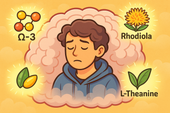
Brain Fog and Body Dysmorphic Disorder: Can Nootropic Supplements Help?
Brain fog often accompanies Body Dysmorphic Disorder, clouding focus and deepening emotional fatigue. Nootropic supplements like L-theanine, Rhodiola, and CoQ10 can help restore mental clarity, balance neurotransmitters, and bring calm energy back to the mind 🌿🧠.
-

How Stress Hormones Like Cortisol May Worsen Body Dysmorphic Disorder
Chronic stress floods the brain with cortisol — the hormone that keeps you on high alert. In Body Dysmorphic Disorder, this chemical overdrive fuels anxiety, distorts self-image, and traps the body in survival mode. Calming cortisol helps restore both peace and perspective 🌿🧠.
-

The Role of Neurotransmitters in BDD—and How Supplements May Help
Neurotransmitters like serotonin, dopamine, glutamate, and GABA shape how people with Body Dysmorphic Disorder perceive themselves. When these brain messengers fall out of balance, perception distorts — but targeted supplements can help restore calm, focus, and emotional regulation 🧠🌿.
-

What Is Body Dysmorphic Disorder? A Deeper Look at the Mind-Body Connection
Body Dysmorphic Disorder (BDD) isn’t just about appearance — it’s about perception. When brain chemistry, trauma, and stress distort self-image, the mind begins to see flaws that aren’t truly there. Healing starts by calming the nervous system and reconnecting mind and body 🪞🧠.
-

Keeping Calm in Competitive Sports: How to Train Your Mind, Body, and Chemistry for Peak Performance
Competitive pressure can overwhelm even the strongest athletes — but calm is trainable. By combining supplements like magnesium, L-theanine, and adaptogens with breathwork and mindset training, you can stay focused, balanced, and in control under any level of stress 🧠🏅.
-

Supplements for Parents Facing Toddler Tantrums: Staying Calm When Little Emotions Run Wild
Toddler tantrums can drain even the most loving parent — but your calm is powerful. With the right supplements like magnesium, L-theanine, and ashwagandha supporting your nervous system, you can stay patient, grounded, and kind, even when emotions run high 🧸🌿.
-

Workplace Stress and Anger Management Support
Workplace stress can quickly turn into frustration — but calm is a skill you can train. By combining supplements like magnesium, L-theanine, and adaptogens with breathwork and mindset tools, you can stay focused, patient, and emotionally grounded no matter how intense the office gets 💼🌿.
-

How to Stay Patient With Family During Stressful Holidays
Holiday gatherings can stir up old stress and test your patience — but calm is possible. With nervous system support from magnesium, L-theanine, and adaptogens, plus mindful breathing and clear boundaries, you can stay centered, kind, and grounded even when family chaos unfolds 🎄💞.
-

Supplements to Keep Calm During Traffic Jams
Getting stuck in traffic doesn’t have to ruin your mood. With calming supplements like magnesium, L-theanine, and ashwagandha, you can train your body to stay relaxed and focused behind the wheel — turning gridlock into a moment of grounded patience 🚗🌿.
-
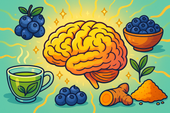
The Role of Antioxidants in Healing Brain Stress from Dissociation
Antioxidants protect the brain from the oxidative stress caused by trauma and dissociation. By neutralizing free radicals and supporting mitochondrial recovery, they help restore clarity, focus, and emotional balance — allowing the mind to heal at the cellular level 🌿🧠.
-
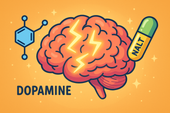
N-Acetyl L-Tyrosine (NALT) for Supporting Mental Clarity
N-Acetyl L-Tyrosine (NALT) fuels dopamine production — the neurotransmitter of focus and motivation. By supporting brain chemistry during stress, NALT helps restore mental clarity, energy, and alertness, making it easier to think clearly and feel present again ⚡🧠.
-

How Ginseng May Improve Focus and Energy in Dissociation
Ginseng helps combat the mental fatigue and fog that often come with dissociation. By supporting mitochondrial energy, balancing neurotransmitters, and regulating cortisol, it gently restores focus, motivation, and emotional presence — helping the mind reconnect with clarity and strength 🌿⚡.
-
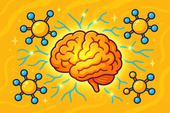
Phosphatidylserine and Dissociation: Supporting Cognitive Function
Phosphatidylserine helps calm the stress response by balancing cortisol, the body’s primary stress hormone. By lowering cortisol spikes, it protects memory, focus, and emotional stability — restoring clarity and mental presence for those struggling with dissociation 🧠🌿.
-
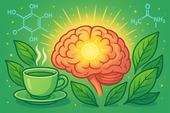
Can Green Tea Extract Help with Dissociative Brain Fog?
Green tea extract may help lift dissociative brain fog by supporting neurotransmitter balance, reducing inflammation, and enhancing energy at the cellular level. With its key compounds EGCG and L-theanine, it promotes calm focus, clarity, and emotional presence — helping you feel more alert and grounded 🍵🧠.
-
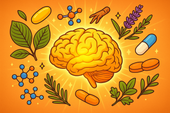
Building a Natural Supplement Stack for Dissociation Support
Building a supplement stack for dissociation means nourishing the brain and body back into communication. By supporting neurotransmitters, gut health, and energy balance through nutrients like magnesium, omega-3s, curcumin, and probiotics, you can help restore clarity, calm, and connection — one layer at a time 🌿🧠.
-

Chamomile and Lavender for Dissociative Anxiety Relief
Chamomile and lavender work together to calm dissociative anxiety by soothing the nervous system and restoring emotional safety. Their natural compounds balance cortisol, enhance GABA activity, and activate the vagus nerve — helping you feel grounded, connected, and at peace again 🌿💜.
-
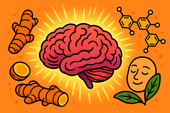
Curcumin for Inflammation and Mental Clarity in Dissociation
Curcumin, the golden compound in turmeric, does more than fight inflammation — it helps clear the mental fog often tied to dissociation. By calming neuroinflammation, balancing neurotransmitters, and supporting mitochondrial energy, curcumin can restore mental clarity, focus, and emotional presence 🌿🧠.
-
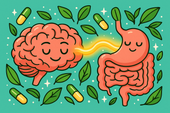
Probiotics and Dissociation: Exploring the Gut–Brain Axis
The gut–brain axis plays a vital role in emotional awareness and presence. When the microbiome is balanced, it supports serotonin production, vagus nerve activity, and calm focus. Probiotics help repair this connection — restoring safety, clarity, and the feeling of truly being in your body again 🌿🧠.
-
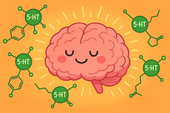
5-HTP for Dissociation: Supporting Serotonin and Emotional Stability
5-HTP helps bridge the gap between emotional numbness and stability by supporting serotonin production — the neurotransmitter that shapes mood, sleep, and sensory awareness. For people experiencing dissociation, 5-HTP may gently restore connection, presence, and emotional balance from the inside out 🌿🧠.

















































